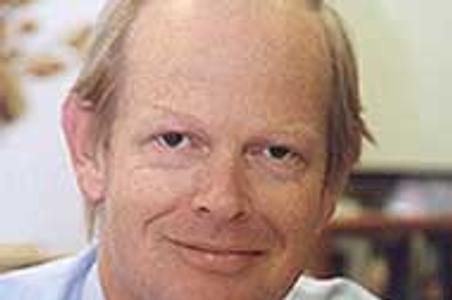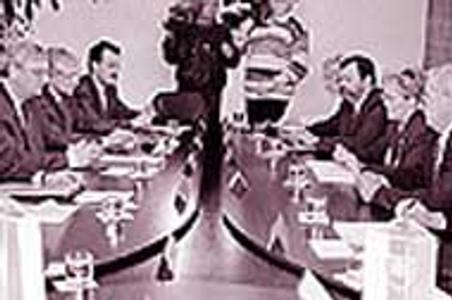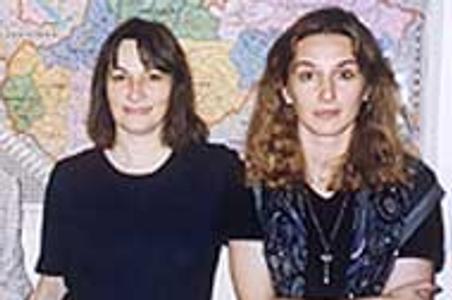Archive of articles - December 1999, page 5
If you desire to read an old article, use the search bar or select the publication date.
David Francis: 'Battle largely won'
Surrounded by cardboard packing boxes in his Petržalka office, Citibank Slovakia's David Francis was in a reflective mood. In four years as the top executive at the country's largest foreign bank, Francis had worked with two governments and seen the best and worst of economic times. Due to leave the job on December 1 to accept a Citibank posting in London, Francis sat down with The Slovak Spectator on November 26 to offer his thoughts on the country's future.The Slovak Spectator (TSS): You've been in your job for four years, and you've mentioned that you've seen some dramatic changes in the economy. Which ones have impressed you the most?
KDH party under funding cloud
The ruling coalition Christian Democrats (KDH) are in big trouble. A political funding scandal, involving more than 67 party officials, the Slovak firm TV Com and the German firm Siemens, has split the KDH into warring factions and has led to a police investigation.The affair began with a report on TV Markíza on November 28 that 67 KDH officials were on the payroll of TV Com, a private media company which is owned by prominent KDH member Peter Gabura. According to Gabura, for the last four years senior party officials had occupied posts as 'advertisement executives' with the Fakty weekly published by TV Com, and were paid between 10,000 and 20,000 Slovak crowns ($250 to $500) per month.
Employment policy disappoints markets
Spurred by Slovakia's soaring unemployment rate, which at 17.7% is the highest in central Europe, the cabinet approved a two-year plan on November 24 which aims to lower the number of jobless citizens, especially those under age 29, and clamp down on illegal work.Analysts, however, were not impressed by the effort, saying that the plan falls short of providing a long-term solution for Slovakia's unemployment woes. Unemployment in the neighbouring Czech Republic in 1998 was almost 10% lower, at 6.5%, while in Hungary the jobless rate was 7.8% and 10.6% in Poland.
Community Grapevine
BCC throws Christmas Party to honour donorsInternational Women's Club holds children's Christmas party450 celebrate Thanksgiving with AmCham
Country pays for pro-west stance
Having declared a pro-western economic stance for more than a year, the Dzurinda government is now faced with a much lower than expected payment by Russia in settlement of its debt to Slovakia. Slovak Finance Minister Brigita Schmögnerová and Russian Deputy Finance Minister Vladimír Volkov agreed on November 18 in Bratislava to a settlement of only $13 million for 1999, far below the $150 million the Slovak side had expected, while another $40 million will be paid off in the year 2000.The Russians cited an August agreement with the so called Paris Club - a group consisting of most of the world's developed countries including France, Germany and the United Kingdom, who are Russia's largest creditors - which allowed Russia to defer principal payments and instead pay only the interest on its debts to club members in 1999 and 2000. "We [the Russian government] simply cannot pay more to Slovakia than we pay to members
'IT Klub' warms to task of lobbying government
Frustrated by a stagnant IT market burdened by non-transparent government IT project tenders, nine Slovak IT firms have united to form an 'IT Klub.' Their goal is to create a unified voice for change that the government will not be able to ignore."All the biggest IT tenders in Slovakia have seemed non-transparent," said Ján Kondáš, director of strategic marketing for the Martin-based IT firm Gity Slovakia. In support of his criticism Kondáš cited the cancellation of the GSM 1800 mobile phone tender, the selection of Andersen Consulting to manage the installation of a software system at Slovenské Telekomunikácie (ST) and numerous delays in the vital ST privatisation process.
NGO's driving Internet growth
Non-governmental organisations (NGOs) in the late 1990s have come to play a vital role in Slovak society. In addition to organizing civic campaigns to bring out the vote in last September's elections and educating the public on environmental, social and economic issues, NGOs have also been the main engine of Internet growth and IT education in Slovakia.According to the 1999 Global Report on Slovakia, published by the Bratislava-based Institute for Public Policy (IVO), the largest source of NGO funding in Slovakia in 1998 was the Open Society Foundation (OSF), which provided over 65 million Slovak crowns ($1.5 million) in support of various projects. OSF Director Alena Pániková said that most of the money had gone towards IT and Internet promotion, which has been a focus of her NGO since 1995.
- The law changed. Our family papers were ready. Now my kids are Slovak citizens
- Slovak female triathlete shatters barriers with historic win at Himalayan event
- Maria Theresa on the banks of Bratislava
- From eight to thousands of runners. How Košice marathon rose to prominence Photo
- The Kremlin’s security agency has a Russian contractor in Slovakia - no one has noticed
- No more photos or bank statements? Slovakia moves to ease residence process
- Iconic Slovak barn still draws crowds. Without donors, it might have been lost Photo
- Slovakia loses another EV model to Spain as Stellantis chooses Zaragoza over Trnava
- The law changed. Our family papers were ready. Now my kids are Slovak citizens
- Slovak female triathlete shatters barriers with historic win at Himalayan event
- Top 10 events in Bratislava for foreigners
- Slovakia loses another EV model to Spain as Stellantis chooses Zaragoza over Trnava
- No more photos or bank statements? Slovakia moves to ease residence process
- Convicted of multiple murders, Slovakia’s mafia boss seeks release from prison
- Weekend: Celebration of fun comes to Malacky Photo
- News digest: Prosecutor seeks jail for NBS Governor Kažimír as his political support wanes
- Maria Theresa on the banks of Bratislava
- No more photos or bank statements? Slovakia moves to ease residence process
- Weekend: Celebration of fun comes to Malacky Photo
- 3 free things to do in Bratislava in the next seven days
- Top 10 events in Bratislava for foreigners
- The law changed. Our family papers were ready. Now my kids are Slovak citizens
- Digital Jarvis is real now. He is coming for your to-do list
- The Kremlin’s security agency has a Russian contractor in Slovakia - no one has noticed
- Maria Theresa on the banks of Bratislava
- No more photos or bank statements? Slovakia moves to ease residence process
- A mayor resigns over €2.7 million fraud scandal at town hall
- Fico praises China and Vietnam as models, says liberal democracy has failed
- He designed Gatwick. But this is his masterpiece
- News digest: Violent gang in Bratislava is under arrest
- The Kremlin’s security agency has a Russian contractor in Slovakia - no one has noticed
- Weekend: Celebration of fun comes to Malacky Photo
- The law changed. Our family papers were ready. Now my kids are Slovak citizens
- News digest: Prosecutor seeks jail for NBS Governor Kažimír as his political support wanes
- Slovakia loses another EV model to Spain as Stellantis chooses Zaragoza over Trnava
- Slovak female triathlete shatters barriers with historic win at Himalayan event
- Weekend: Celebration of fun comes to Malacky Photo
- News digest: Fico’s bloc wants to save money by restricting electoral access
- Slovakia plans to restrict access to new medicines amid funding shortfall
- No more photos or bank statements? Slovakia moves to ease residence process More articles ›






